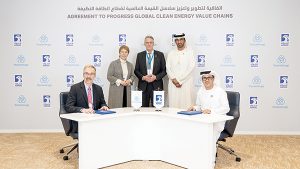Abu Dhabi / WAM
Abu Dhabi National Oil Company (Adnoc), a responsible provider of reliable, lower-carbon intensity energy, announced on Tuesday that it has signed a memorandum of understanding (MoU) with Thyssenkrupp Uhde, a Germany-based subsidiary of thyssenkrupp group that specialises in chemical engineering, to explore a long-term partnership to create new markets for hydrogen and promote global clean energy value chains.
Signed at Abu Dhabi Sustainability Week (ADSW), the agreement will focus on the development of projects for large-scale ammonia cracking, which is used to extract hydrogen from ammonia after transportation. Ammonia is a carrier of hydrogen, and it is much easier to compress and transport. When shipped, after arriving at its destination, the ammonia needs to be decomposed, or “cracked,†into hydrogen, before use in the energy value chain.
Under the agreement, the companies will work together to develop large-scale ammonia cracking plants with thyssenkrupp technology. The agreement will also lead to the exploration of opportunities in the clean energy value chain for the supply and shipment of low-carbon or green ammonia from the UAE to large-scale ammonia cracking facilities globally.
Musabbeh Al Kaabi, Executive Director, Low Carbon Solutions and International Growth Directorate, said, “Adnoc’s fast-growing hydrogen business is enabled by the UAE’s abundant and competitive energy reserves. We are committed to strengthening our position as a reliable supplier of lower carbon-intensive energy, creating new revenue streams and growing the global market for hydrogen. In doing so, we will work with like-minded partners, such as thyssenkrupp to deliver tangible solutions that contribute to the decarbonisation of the energy sector.â€
The ammonia cracking process is based on globally proven Uhde reformer technology, which is applied in over 130 large-scale chemical plants across the world.
Cord Landsmann, thyssenkrupp Uhde CEO, said, “Countries in Europe, along with many others, are looking to clean hydrogen imports to decarbonise industry and society. Clean ammonia is the best way to transport hydrogen by ship, and together with Adnoc, we will deliver the last piece of the puzzle for global clean hydrogen trade at large scale.â€
Adnoc has already invested in low-carbon ammonia, where the carbon dioxide (CO2) emitted during production is captured and stored underground. In May 2021, the company announced a 1 million tonnes per year low-carbon ammonia production facility at the Ta’ziz industrial ecosystem and chemicals hub. The company has significantly expanded its strategic energy partnerships across the hydrogen value chain and shipped demonstration cargoes of low-carbon ammonia to customers in Germany and Asia to test its application.
Adnoc is also investing in green hydrogen – and renewable energy – through Abu Dhabi Future Energy Company (Masdar), a clean-energy powerhouse that will place the UAE at the forefront of the energy transition. Through this investment, Adnoc aims to become a world leader in green hydrogen.
Adnoc plans to turn CO2 into rock
Abu Dhabi / WAM
Adnoc on Tuesday announced a partnership with the Fujairah Natural Resources Corporation (FNRC), Abu Dhabi Future Energy Company (Masdar) and 44.01 to pilot technology that permanently mineralises carbon dioxide (CO2) within rock formations found in the emirate of Fujairah.
The announcement was made at the Abu Dhabi Sustainability Week (ADSW).
The project, due to commence in January, will use 44.01’s Earthshot prize-winning Carbon Capture and Mineralisation (CCM) technology to eliminate CO2 from the atmosphere. It will be the first CCM project by an energy company in the Middle East.
Sophie Hildebrand, Chief Technology Officer at Adnoc, said, “Across Adnoc, we are committed to finding new ways to decarbonise our operations, while meeting our responsibility to supply vital energy to the world. As the first energy company in the region to run a carbon-negative project of this kind, this pilot marks the latest step in our $15 billion investment into projects that will reduce our carbon footprint and help us achieve our Net Zero by 2050 ambition.”
Fujairah has been selected for this pilot for to its abundance of peridotite, a form of rock that naturally reacts with CO2 to mineralise it.
Muhammad Saif Al Afkham, Chairman of the Board of Directors for Fujairah Natural Resources Corporation, said, “We are proud to support Adnoc and our other partners to catalyse this natural process with 44.01’s technology. Success here could pave the way to help us make a significant contribution towards the UAE Net Zero by 2050 Strategic Initiative.”
In this pilot, CO2 will be captured from the air, dissolved in seawater, and then injected into peridotite formations deep underground, where it will mineralise – ensuring that it cannot escape back into the atmosphere.
Talal Hasan, Founder and CEO of 44.01, stated, “Removing CO2 from the atmosphere is vital if we are to halt and ultimately reverse climate change. Unlike CO2 storage, mineralisation removes CO2 permanently by turning it into rock, minimising the need for long-term monitoring and insurance. This pilot will enable us to test our technology at scale, on our way to offering a safe, cost-effective, natural solution for eliminating captured CO2 internationally.”
The project will be powered by solar energy supplied by Masdar. A successful pilot would open the possibility of mineralising billions of tons of captured CO2 across the region.
 The Gulf Time Newspaper One of the finest business newspapers in the UAE brought to you by our professional writers and editors.
The Gulf Time Newspaper One of the finest business newspapers in the UAE brought to you by our professional writers and editors.
